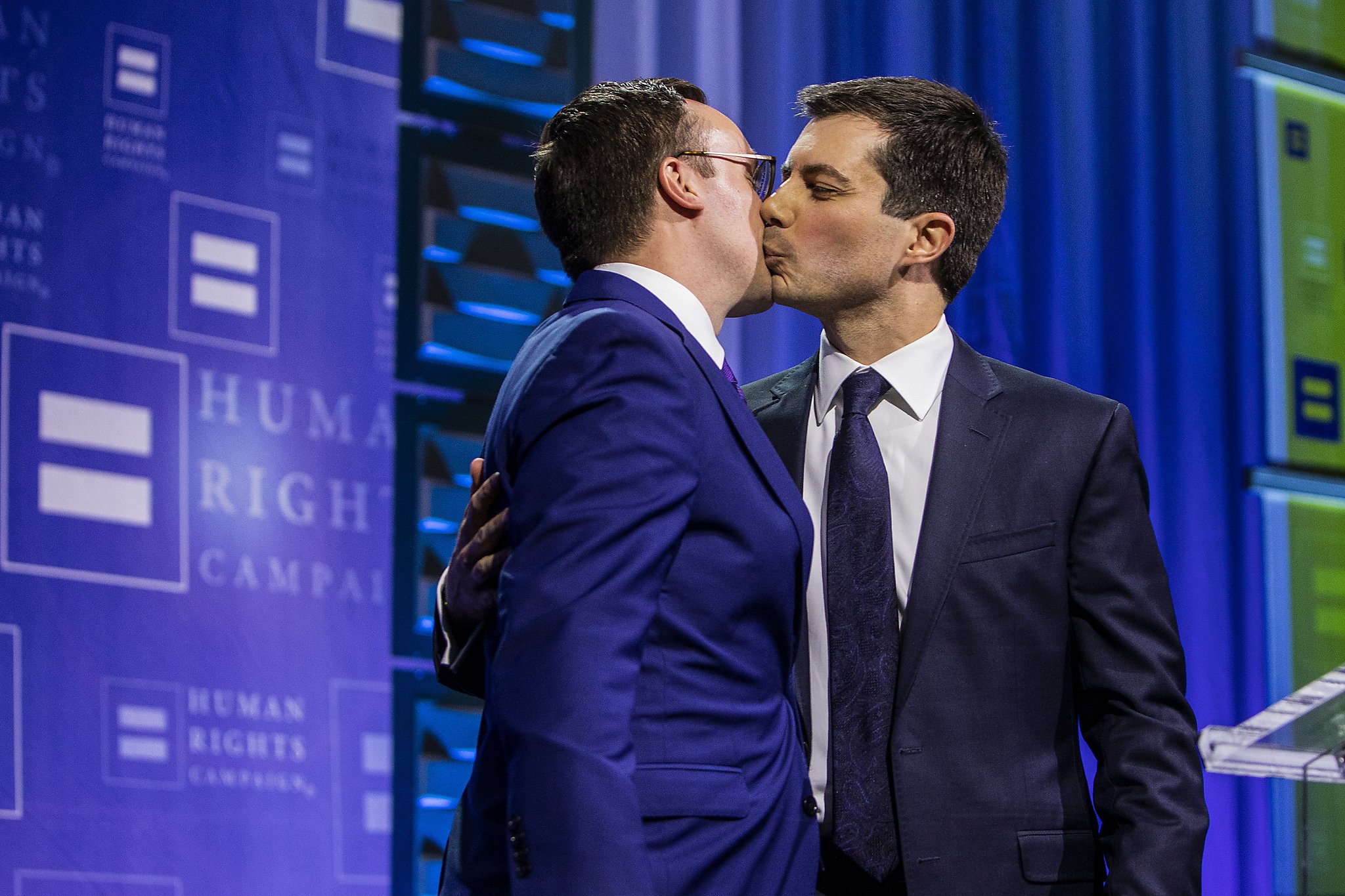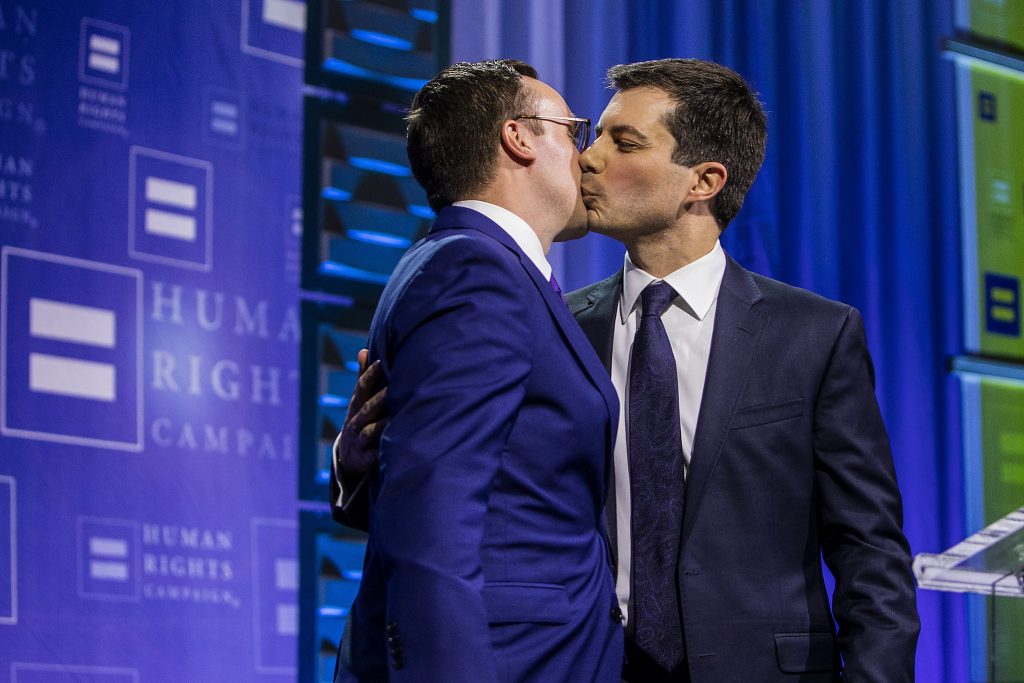
The top 10 LGBTQ news stories of 2020: A harsh year with incredible LGBTQ milestones
by Lisa Keen
Keen News Service
(This report was previously published by the Keen News Service, which covers national political and legal news for LGBTQ news media organizations around the country.)
In 2020, the nation faced two existential threats — an out-of-control coronavirus pandemic that killed more than 340,000 people in the United States in less than 12 months, and an erratic, self-obsessed president whose administration repeatedly withheld critical support against the virus from states and held campaign rallies where hundreds of people gathered closely together without masks.
The threats blended as President Donald Trump allowed the pandemic to spread and openly attempted to subvert the results of the November election which he lost by seven million popular votes and 74 Electoral College votes.
And while both of these threats dominated the news throughout 2020, there were some LGBTQ-specific events that stood out for the history books. Here are our candidates for 2020’s Top Ten LGBTQ news stories:
Number 10: Gay man to cabinet-level position
President Trump named an openly gay man to a cabinet-level position February 20. Richard Grenell, a long-time Republican gay activist and staunch Trump supporter, became the nation’s Acting Director of National Intelligence. The appointment, albeit a temporary one, made Grenell, who had been serving as ambassador to Germany, the first openly gay person to serve in a cabinet-level position.
Trump announced the appointment in a Twitter post February 19, between posts admiring the long line of people waiting to see him at a campaign rally in Arizona. Unlike cabinet positions, the cabinet-level appointment did not require Senate confirmation, and the White House indicated the president intended to appoint a “permanent nominee” as soon as March 11. But Grenell stayed on in the post until late May.
The appointment was quickly criticized by a wide range of people who said Grenell had no qualifications or experience to justify the appointment to such a high position. Others suggested the existing Acting Director of National Intelligence was being ousted over Trump’s dismay over a classified briefing the DNI office gave to the House Intelligence Committee. That briefing reportedly told lawmakers that Russia is trying to interfere in the 2020 elections to promote a Trump re-election.
Grenell continued to serve as ambassador to Germany while holding the title Acting Director of National Intelligence. He left the ambassador post shortly after his stint as DNI ended in late May. Grenell then began work organizing LGBTQ support for Trump’s re-election.
Number 9: An expanded Congressional caucus
Two African-American gay men won seats to the U.S. House in November, bringing to 11 the number of openly LGBTQ people in the U.S. Congress. They are the first African-American LGBTQ members of Congress, and their first weeks preparing for service indicate they are likely to make a significant impact.
Mondaire Jones, elected to New York’s 17th congressional seat, made history again when other first-term Democratic members of the U.S. House elected him to represent them at the weekly Democratic leadership meetings. Jones was selected to be part of a council which advises House Speaker Nancy Pelosi on who should serve on various House committees. And Speaker Pelosi announced December 18 that Jones, an attorney who worked under then-U.S. Attorney General Eric Holder to vet nominees for federal court seats, would be appointed to the House Judiciary Committee.
Ritchie Torres spent seven years representing the Bronx on the New York City Council, where his work focused on helping to ease housing and other problems for people with low incomes. After beating out a large field of contenders for the Democratic nomination, he won the general election in November for the 15th congressional seat for New York. Torres, who lived in public housing as a child, told the New York Post his priority would be “to fight for full federal funding for public housing.” Speaker Pelosi announced December 17 that Torres would be the only first-term member to be appointed to the House Financial Services Committee, which oversees “all components of the nation’s housing and financial services sectors.”
Number 8: Buttigieg becomes a contender
At the end of January 2020, Pete Buttigieg was in an unprecedented position for an openly gay presidential contender. He was polling second in a New York Times poll of likely voters in Iowa just days ahead of the first-in-the-nation presidential primary voting. Buttigieg being gay made him stand out in the first few months of his campaign last year, earning him a surge of media attention that his relatively obscure reputation as the mayor of South Bend, Ind., might not have inspired. But focus on that character trait died down as Buttigieg introduced voters to the rest of his resume and his ability to thoughtfully respond to issues and debate.
Polling indicated Buttigieg was winning over a wide range of supporters. Voters were seeing him as the second most intelligent candidate (behind U.S. Senator Elizabeth Warren), appreciating his having served in Afghanistan, and liking his willingness to share his religious beliefs. Buttigieg came in first place in Iowa, with 26.2 percent of the vote, a tenth a point ahead of second place U.S. Sen. Bernie Sanders. In New Hampshire, he came in second behind Sanders.

His success quickly brought on some hostile attempts to derail his campaign. Right-wing talk radio host Rush Limbaugh told listeners he thought Democrats were probably worried that one of their frontrunners was a “gay guy” who “loves to kiss his husband on the debate stage.”
In Nevada, Buttigieg fell to third place behind former Vice President Joe Biden (in second) and Sanders (in first). When Biden won the South Carolina primary, Buttigieg came in fourth with only eight percent of the vote, and exit polling indicated he had won less than three percent of the votes among African Americans, a critical constituency for a Democratic presidential victory. Two days before Super Tuesday voting, Buttigieg acknowledged that “the path has narrowed to a close for our candidacy” and withdrew from the race. He quickly endorsed Biden and was given a high-profile speaking slot on the last night of the Democratic National Convention.
Number 7: Buttigieg named to cabinet
Following Joe Biden’s election as the next president, there was much anticipation about the possibility of an important appointment for Pete Buttigieg. On December 16, Biden held a special news conference to announce his appointment of Buttigieg as his secretary of transportation. It marked the first time an openly LGBTQ person had been appointed to a full-fledged seat in a presidential cabinet. At age 38, Buttigieg will, if confirmed, be the youngest person in Biden’s cabinet.
“The Biden-Harris cabinet will be an historic cabinet, a cabinet that looks like America, a cabinet that taps into the best of America, a cabinet that is opening doors and breaking down barriers and accessing the full range of talent,” said Biden in his announcement. He called Buttigieg “one of the smartest people you’ll ever meet” and a “policy wonk with a big heart.” And he noted that Buttigieg’s husband, Chasten, “has become a close friend of Jill’s and mine.”
Buttigieg thanked Biden for the appointment and acknowledged the historic importance of his appointment as an openly gay man.
“I’m mindful that the eyes of history are on this appointment, knowing that this is the first time an American president has ever sent an openly LGBTQ cabinet member to the Senate for confirmation,” said Buttigieg. “I can remember watching the news, 17 years old in Indiana, seeing a story about an appointee of President Clinton named to be an ambassador, attacked and denied a vote in the Senate because he was gay, ultimately able to serve only by recess appointment.” He was referring to James Hormel, who Clinton appointed to serve as ambassador to Luxembourg in 1987.
Buttigieg’s appointment must now go before the U.S. Senate for confirmation. The Department of Transportation oversees the safety and efficiency of the nation’s transportation systems, including the airlines, railways, public transit, highways, maritime shipping, and oil pipelines. His nomination will go before the Senate Committee on Commerce, Science and Transportation.
Number 6: Supreme Court tackles religious right to bias
In February, the U.S. Supreme Court announced it would review a lower court decision that had held a Catholic foster care agency could not discriminate against same-sex couples. It was troubling news for LGBTQ legal activists. The conflict had been a long-standing one with implications beyond church-run organizations and foster care. It could have impact on conflicts involving business vendors who have religious objections to serving same-sex couples.
The oral argument was held November 4, one day after the presidential election, when it was not yet clear whether Biden had unseated Trump. And it was only the third day that the court’s newest member, Amy Coney Barrett, was taking part in oral arguments. The presidential election and Barrett’s lightning speed confirmation to take the seat held for 27 years by the court’s most progressive member, Ruth Bader Ginsburg, overshadowed the significance of the two-hour-long argument in Fulton v. Philadelphia.
Fulton was the latest in a long line of lawsuits that have attempted to secure an exemption for some people and businesses to laws prohibiting discrimination based on sexual orientation and gender identity. Those arguing for the exemptions claim that requiring them to obey the non-discrimination laws violates their First Amendment freedom to exercise their religious beliefs that are hostile to LGBTQ people. Opponents of such arguments say people and businesses have a First Amendment right to believe what they want but, if they voluntarily operate in the public arena, they must abide by laws governing the public, including laws prohibiting discrimination based on sexual orientation and gender identity.
Number 5: Supreme Court rules Title VII counts
In what was perhaps the most stunning U.S. Supreme Court victory in history for LGBTQ people, the nation’s highest court announced a 6 to 3 decision June 15 that holds a federal law barring discrimination on the basis of “sex” in employment also bars discrimination based on “sexual orientation” and “gender status.” The court’s decision came in three cases testing the reach of Title VII of the federal Civil Rights Act in one 33-page opinion consolidated under Bostock v. Clayton County. In words that will no doubt be highlighted for many years to come, Justice Neil Gorsuch (a Trump appointee who replaced the late conservative Justice Antonin Scalia) wrote:
“Ours is a society of written laws. Judges are not free to overlook plain statutory commands on the strength of nothing more than suppositions about intentions or guesswork about expectations. In Title VII, Congress adopted broad language making it illegal for an employer to rely on an employee’s sex when deciding to fire that employee. We do not hesitate to recognize today a necessary consequence of that legislative choice: An employer who fires an individual merely for being gay or transgender defies the law.”
The decision put Gorsuch and Chief Justice John Roberts Jr. on the side of the court’s more progressive four justices. And, statistically speaking, it established Roberts and Gorsuch as moderates on issues relating to LGBTQ-specific cases.
Number 4: Ruth Bader Ginsburg dies
The most LGBTQ supportive justice on the U.S. Supreme Court died in September: Ruth Bader Ginsburg. The 87-year-old legal giant succumbed following a years-long struggle against pancreatic cancer. Best known for her historic work on behalf of securing equal rights for women, she was also a steadfast supporter of equal rights for other groups, including LGBTQ people.
Her voting record was the most consistently pro-LGBTQ record of any justice on the bench. In the 15 LGBT-related decisions before the U.S. Supreme Court during her 27 years there, Ginsburg voted in favor of equal rights for LGBTQ people 13 times. She provided the pivotal fifth vote in several LGBTQ victories, including Hollingsworth v. Perry, which led to California allowing same-sex couples to marry in 2013, and U.S. v. Windsor, which struck down the federal Defense of Marriage Act that same year. She was also the fifth vote on Obergefell v. Hodges in 2015, which struck down state bans on marriage for same-sex couples. And in June of this year, she was one of six justices to rule, in Bostock v. Clayton, that the language in Title VII of the federal Civil Rights Act that prohibits discrimination in employment “on the basis of sex” also covers discrimination based on sexual orientation and gender identity.
Within days of Ginsburg’s death, Trump nominated Amy Coney Barrett, a federal appeals judge who LGBTQ groups had adamantly opposed for a Seventh Circuit seat, saying her “religiously-infused moral beliefs would inform her judicial decision-making.” U.S. Senate Majority Leader Mitch McConnell rushed through Barrett’s confirmation, and the Senate confirmed her nomination by a 52 to 48 party-line vote.
Number 3: Racial reckoning in a powerful movement
Following a steady stream of incidents around the country in which white police officers killed unarmed Black men, Black Lives Matter — started by three Black women, two of whom identify as queer — organized peaceful protests that attracted the support and participation of millions of people. The queer co-founders, Alicia Garza and Patrisse Cullers, along with co-founder Opal Tometi, started Black Lives Matter in 2013, with a mission statement that also embraced “the lives of Black queer and trans folks, disabled folks, undocumented folks, folks with records, women, and all Black lives along the gender spectrum.”
In 2020, it became a major political force, organizing non-violent demonstrations around the world to protest police brutality against black people. Its movement grew dramatically following the highly publicized killing of a Minneapolis man, George Floyd, by a white police officer who arrested Floyd for allegedly trying to pass a counterfeit bill. The Black Lives Matter name became a chant and, as several polls indicated, as many as 26 million Americans participated in protests inspired by the group’s voice. The New York Times reported that “Black Lives Matter may be the largest movement in U.S. History.”
“While the group isn’t necessarily directing each protest,” stated a July 3 New York Times report, “it provides materials, guidance and a framework for new activists…. [and those] activists are taking to social media to quickly share protest details to a wide audience.” Quoting a Stanford University professor of social movements, the article ended: “It looks, for all the world, like these protests are achieving what very few do: setting in motion a period of significant, sustained, and widespread social, political change. We appear to be experiencing a social change tipping point — that is as rare in society as it is potentially consequential.”
Number 2: A new president is elected
Democratic presidential nominee Joe Biden won the popular vote for president November 3 and the Electoral College vote December 14. There was conflicting information over how strongly LGBTQ voters supported Biden. Exit polls conducted by the National Election Pool for the New York Times and major television networks found that 61 percent of surveyed voters who identified as LGBTQ said they voted for Biden, while 28 percent voted for Trump. (The LGBTQ data was based on approximately 1,100 self-identified voters, or seven percent of 15,590 voters.) The 28 percent for Trump was twice as many LGBTQ votes as he got in 2016, when he beat Democrat Hillary Clinton.
But voting data from precincts with heavily LGBTQ populations suggested LGBTQ voters set new records in their support for Biden and new lows for Trump. Heavily LGBTQ precincts in the Castro neighborhood of San Francisco and in the popular LGBTQ vacation town of Provincetown, Mass., showed 91 percent or more voters supported the Democratic ticket of Biden and Senator Kamala Harris. Support for Trump ran between only two and eight percent. In the heavily LGBTQ city of Wilton Manor, Fla., support for Biden ran between 79 and 82 percent; Trump support there fell to between 17 and 19 percent. In five heavily LGBTQ neighborhoods in Philadelphia, Biden won between 84 and 92 percent of the vote. This higher percentage of support for Biden was supported by a survey of 800 LGBTQ voters just after the election. That survey, commissioned by the national LGBTQ media group GLAAD, found 81 percent of LGBTQ voters supported Biden and 14 percent supported Trump. Regardless of the margins, the LGBTQ community is expected to fare much better under Biden than it has under Trump.
Number 1: COVID changed everything
A virulent new coronavirus emerged in January 2020 and was dubbed COVID-19, standing for Corona Virus Disease first identified in 2019. The virus emerged from China but, by March, there were enough cases springing up around the United States that public health officials called for immediate shutdowns of schools, businesses, restaurants, and public gatherings of all types. As the pandemic grew and continued into April and May, many LGBTQ bars and restaurants began to close permanently. The loss of revenue from the advertising those businesses would typically buy from local LGBTQ newspapers — including loss of sites where such papers could be easily distributed to the community — soon caused many LGBTQ newspapers to suffer, too. Many had to cut back on staff and publish online only.
By June, in most cities, including New York City, the LGBTQ community canceled annual pride parades and celebrations, abruptly cutting off what for many organizations was one of their most revenue-producing events of the year. CenterLink, a national coalition of LGBTQ community centers, said in May that over half its members were having to cancel fundraising events and that one-third expected they would have to shut down operations within two months because of COVID. The Trevor Project, a national group that works to prevent suicide among LGBTQ youth, said it had seen a surge in young people seeking help during the COVID pandemic.
A poll of 800 LGBTQ people in November found that 54 percent of LGBTQ voters considered the COVID-19 response the most important issue in deciding how to vote. Thirty-six percent of the respondents said a close friend or family member had tested positive for COVID, 29 percent lost their job or saw a reduction in work, 11 percent had to change their living arrangements, and 10 percent lost a close friend or family member who died from COVID-19.
A report from Human Rights Campaign estimated that more than five million LGBTQ people work in industries “heavily impacted by the COVID-19 epidemic,” such as restaurants, hospitals, schools, and retail. A report from the National LGBT Cancer Network indicated that the LGBTQ community uses tobacco at rates 50 percent higher than the general population, making them particularly vulnerable to the respiratory virus. And a study by the Movement Advancement Project found that 45 percent of 47 nonprofit LGBTQ organizations surveyed had to reduce their 2020 budgets by an average of about 17 percent.
At the end of the year, there was a growing concern about a new strain of the virus (called S gene variant) in the United Kingdom that appeared to be spreading even more easily. Several nations, including the U.K. and the United States, had begun inoculating citizens with newly developed vaccines that experts believe will still be effective in stopping even this variation of the virus. But concerns emerged quickly in the U.S. that the Trump administration had failed to develop any plan to help enable local governments to administer the vaccine. Starting January 20, with the inauguration of a new president, many expect the U.S. response to fighting the pandemic will, at last, be given a serious level of priority and resources from the White House.
SPECIAL REPORT
Volume 22
Issue 10








